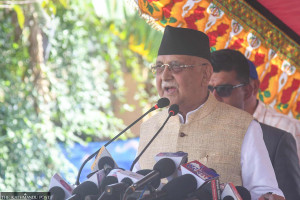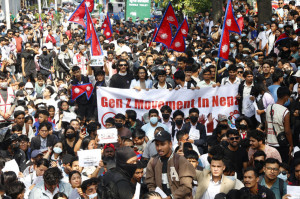Opinion
The onrushing wave
A country cannot develop by merely exporting its workforce
Rajesh Gautam
In recent years, remittance has become one of the major sources of revenue for Nepal’s economy. More than four million Nepali youths are currently working abroad and sending money to their families. These families entirely depend on this money to fulfill their basic needs. While observing our economic structure, the inflow of remittances is increasingly overriding internal production. Against this background, how long can the economy sustain on this external source of income is an unavoidable question.
Over the last decade, foreign employment has had a huge impact on the socio-economic scenario of Nepali people. It has lifted the living standards of millions of people and changed their economic, social and professional behaviour along with bringing changes in the demographic structure of the country. It has disrupted the overall development process and resulted in socio-economic problems which might bring have undesirable consequences in the future for Nepal.
Adverse effects
Barren fields and few workers in the factory have disturbed the circular flow of national economy. Likewise, the domestic authority over the economy is also weakening. The increasing number of Nepali youths migrating abroad for employment has led to a shortage of workers within the country, leaving no choice but to import foreign workers at a high price. This is hindering the development process and contributing to the mounting inflation. The money sent from abroad is creating demand for goods and services for consumption, but not to production. The result: trade is highly dominated by imports and inflation due to the consumption pattern. This has a long-term effect on the investment and production model of the economy and a circular chain of external dependency.
As remittance is one of the factors that determine price and foreign exchange rate, which is very external in nature, the measures taken by the concerned monetary authorities have not been effective. The inflow of remittance are not internally controlled and has thus lessened the actual value of real income.
A country cannot attain development by exporting human capital alone. Globally, human resources are taken as the most valuable and important resource for socio-economic development and nation building. Our countrymen are literally building the Gulf on their blood and sweat, while in Nepal, where the techno-based industries are in need of more people.
Foreign employment is not only the issue of the labour market. When one observes the characteristics of the Nepali economy, we find that it bears supply-side constraints. Hence, if labour force is not appropriately mobilised, it does not only affect the labour market but also the monetary market. So the government needs to focus on generating employment for the economy to operate smoothly.
Required initiatives
The current circumstances are due to lack of proper government policies in place. The government does not even know what its priorities for economic growth are. In some government documents foreign employment is even taken as a source of state revenue. In this context, better policies for internal employment should be enforced and it should implement proper programmes and projects to replace foreign employment.
Therefore, it is imperative for the government to manage foreign employment. Foreign employment can never be a sustainable source of income for any country. If Nepal continues to depend on this external source of money, there is a high possibility of an economic crisis in the country. So it is essential to shift Nepali labourers from abroad to domestic economy. Foreign employment is like an addiction to any economy; hence gradual steps need to be taken to address this issue. First, Nepali workers should not be allowed to take employment in those countries and for those professions which are not so beneficial and safe. Moreover, there should be creations of jobs inside the country for these people. Hydropower can be a good alternate for this purpose, as it can meet the demand of employment and production. For sustainable economic growth and balanced circular flow of income, creating employment opportunities inside the country should be the prime concern for the government.
Gautam is affiliated with the Ministry of Land Reform and Management




 16.12°C Kathmandu
16.12°C Kathmandu










